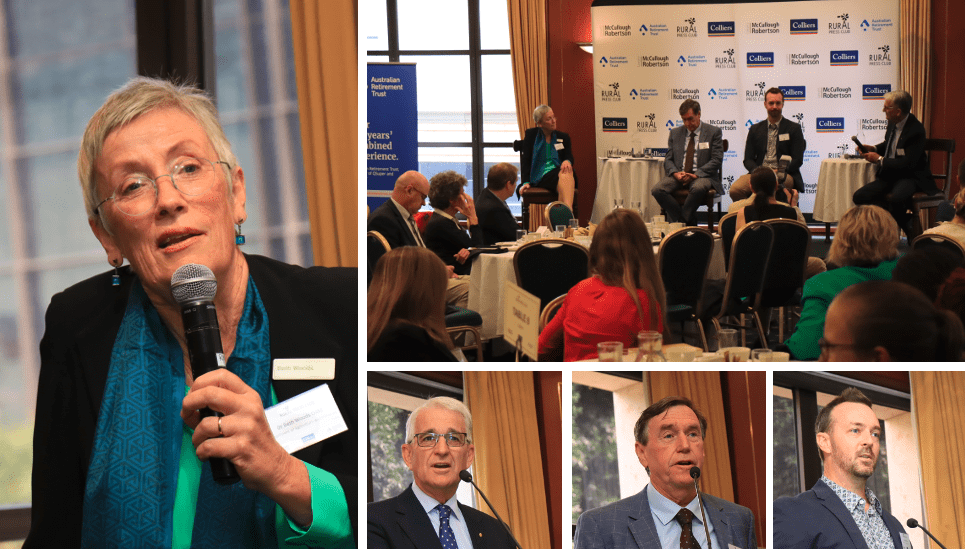
Clockwise from left: Dr Beth Woods, panel discussion, Professor Lee Hickey, Dr Brian Keating, Crawford Fund chair John Anderson.
A PANEL session hosted by the Rural Press Club of Queensland in Brisbane yesterday opened a window to the not-often discussed “win-win” world of Australian aid-funded agricultural research in the Pacific, Asia and Africa.
While people in the Australian ag sector may have an understanding of the benefits this work provides to farmers and their economies in developing countries, they may not be as aware of the benefits that also flow back to Australia.
Those benefits were laid out in a comprehensive study commissioned by the Crawford Fund last year – a not for profit organisation that invests in research and training to improve farming systems in developing countries and Australia – which showed that for every $1 Australia invests in this work, the return is conservatively estimated at around $10 back to Australia. (More details here)
Crawford Fund chair, and former Deputy Prime Minister of Australia, John Anderson, told the audience that returns flowed back in a variety of ways including through enhancing the knowledge, understanding and expertise of Australia ag scientists and policy makers, along with improving Australia’s ability to prepare for and deal with biosecurity incursions.
There was nothing Australia did better than agricultural research and extension, he said, which provided the “win-win” of being profitable for Australia while also making a big difference in other people’s lives.
“We have dramatically reduced the number of people who are mal or under nourished, and we have hugely cut the number of children who are stunted and don’t reach their potential.
“These are fantastic things to be able to talk of in an age of negativity particularly in the west, where some want to imply that nothing we have done is of any value and we’re encouraged to teach our children that they are inheriting a nightmarish culture that is not worth defending.”
A ‘surprisingly good story’ – but only 2.5pc of aid spend
Australia’s aid-funded agricultural research was a “surprisingly good story” Mr Anderson said.
“It is almost counter-intuitive – it is a way where you can display compassion, help people globally and at the same time help ourselves. It is one of those rare win-wins, it really is.”
Yet, despite the benefits to Australia and developing countries, and Australia’s unmatched expertise in the area, just 2.5 percent of Australia’s aid budget went into aid-funded agricultural research.
“I do say whenever anybody will listen in Government, this is one area in which we could, and should, do more,” he said.
Doing well by doing good
A panel of scientists highlighted how the Crawford Fund principle of “Doing well by doing good” is transforming lives from the wheat and corn fields or Kenya to subsistence crops in the tropics of Asia and the Pacific.
Dr Brian Keating was a young plant scientist with the CSIRO in the early 1980s when he moved with his family to Kenya to help lift productivity in dryland maize and legume farms, in what he described as a “very climatically risky area”.
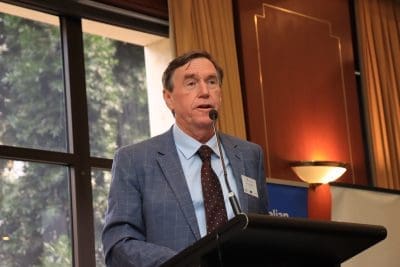 He said his five-year posting in Kenya turned out to be “transformational” in terms of building skills and ability to work in diverse and complex agricultural settings, a foundation which has underpinned his distinguished career in the CSIRO, where he currently serves as executive director of CSIRO’s Agriculture, Food and Health Sector.
He said his five-year posting in Kenya turned out to be “transformational” in terms of building skills and ability to work in diverse and complex agricultural settings, a foundation which has underpinned his distinguished career in the CSIRO, where he currently serves as executive director of CSIRO’s Agriculture, Food and Health Sector.
“I learned what a privilege it was to work with small holder farmers and to be given a window into their day-to-day challenges in securing a livelihood, securing a food supply.
“I didn’t really understand agriculture until I worked in Africa with small holder farmers.”
He said he quickly realised that “everything is difficult here, but some things are possible”, so he focused on what was possible.
The work in Kenya provided the stimulus for the development of APSIM farming system modelling, which 30 years later remains a foundation of agricultural research in Australia and around the world.
Don’t overlook the ‘African Century’
Dr Keating also emphasised the growing prominence of Africa in the global perspective.
“Australia’s aid program rightly is focused around our neighbourhood, the Pacific and South East Asia, but I suggest that we shouldn’t forget Africa,” he said.
“As UNICEF has said, the future of humanity is increasingly African, and there are forces at work there – while the 20th century was the Asian Century, the 21st century will be the African century – every second child in the world in 2100 will be an African child.”
Developing ag essential step to broader economic improvement
Australian Centre for International Agricultural Research commissioner and former Queensland Department of Agriculture and Fisheries director-general, Dr Beth Woods, said there was clear evidence that work to develop agriculture, fisheries and forestry in developing countries was an essential step to driving broader economic development.
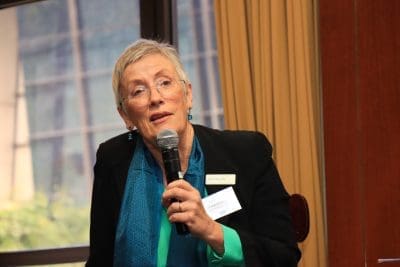 Support from ACIAR had played a crucial role in providing additional funding and multiplying activities to expand the impact of research in priority project areas.
Support from ACIAR had played a crucial role in providing additional funding and multiplying activities to expand the impact of research in priority project areas.
For example, ACIAR had been a major funder of reserch for smaller tropical crops such as pawpaw, mango and lychee, industries that lacked the size and scale to support their own research, but which in turn provided impetus for substantial growth of those industries in Australia.
Support had also enabled local researchers to develop new skills and new knowledge, and provided access to germplasm to support plant breeding through partnerships across the international agricultural research system.
ACIAR funded research was also helping to improve nutrition in Pacific island nations, which included some of the most malnourished populations in the world.
Additionally, some 35,000 Pacific Islanders are now working in regional Australia, supporting agriculture and horticulture industries.
The average Pacific Island worker in that scheme sends home A$15,000 to a country where a third of the population lives on less than A$1000 per year.
“So the impact is enormously important in the Pacific, but it is also enormously important for our industries, because you can’t function without that labour force, and they were the first labour force back into Australia post COVID,” Dr Woods said.
“These links matter in terms of the resilience of our own industries.”
Speed breeding
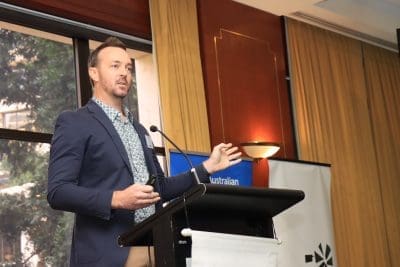 Professor Lee Hickey provided an insight into how speed breeding technology is being introduced to developing countires to grow higher yielding crops with lower fertiliser usage, to meet the challenge of feeding a growing global population.
Professor Lee Hickey provided an insight into how speed breeding technology is being introduced to developing countires to grow higher yielding crops with lower fertiliser usage, to meet the challenge of feeding a growing global population.
Feeding a predicted 10 billion people by 2050 would require an ability to produce 60pc more food, and doubling the rate of genetic improvement of crops.
He described how adapted facilities to harness speed breeding techniques applied to wheat breeding by scientists at the University of Queensland in 2003 are being developed in developing countries in order to help meet this challenge.
Crawford Fund scholarships also offered an ideal way for young scientists to understand food and nutrition security and agricultural research in developing countries, and he encouraged students to apply – more details can be found at this link .

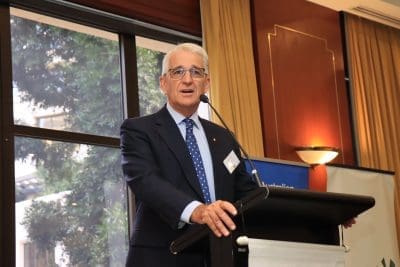


HAVE YOUR SAY